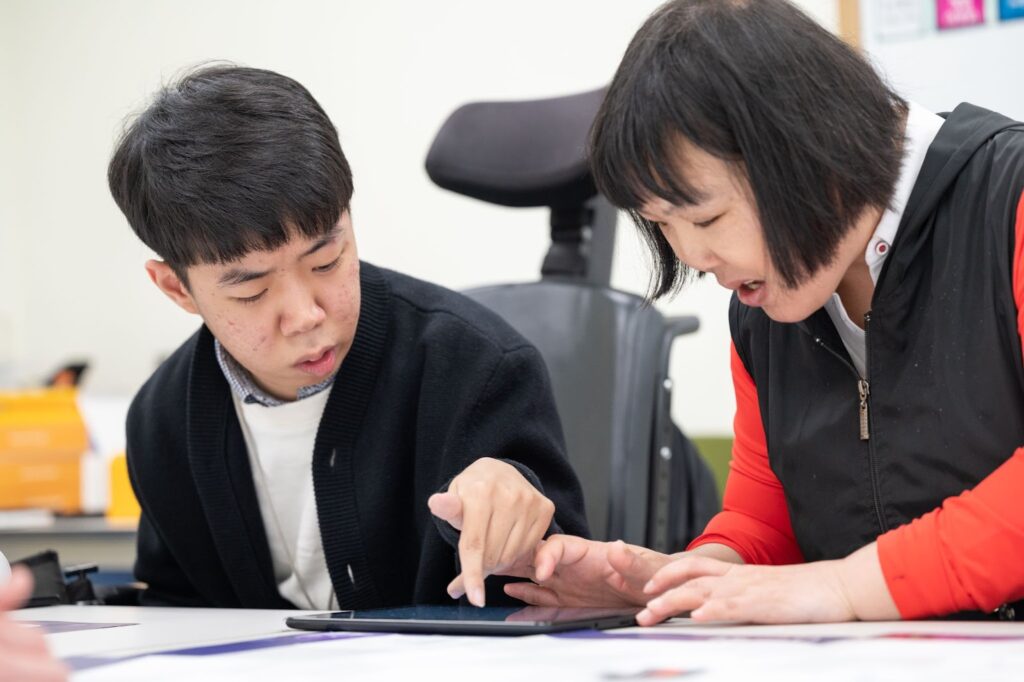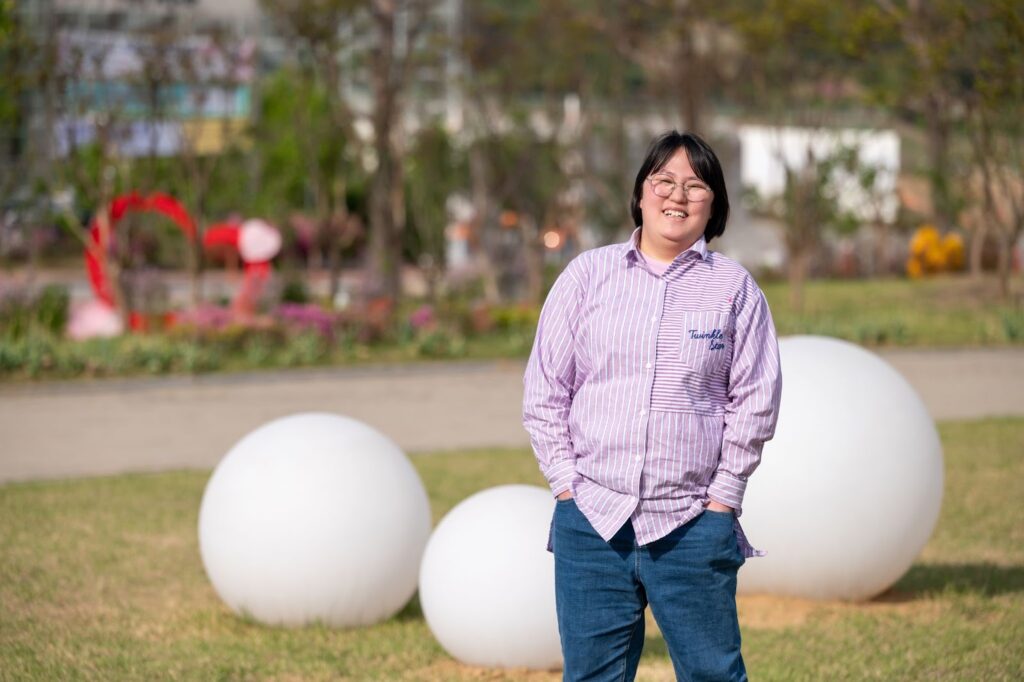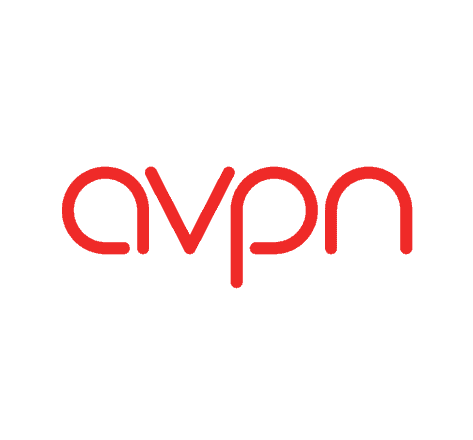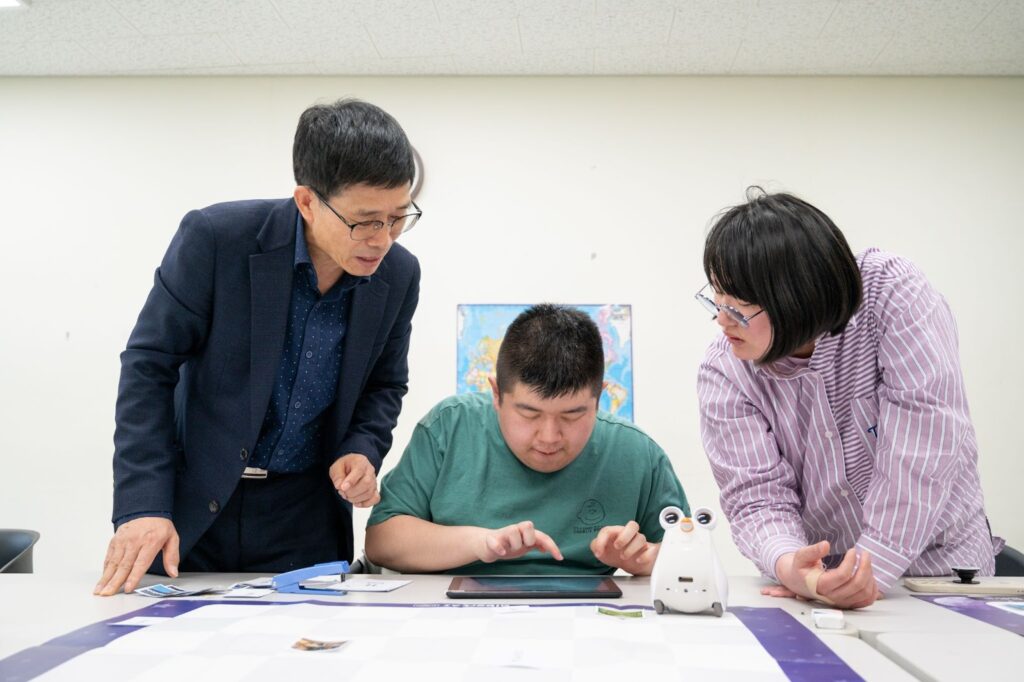7 minutes read
With the support of Google.org, Google’s philanthropic arm, AVPN (Asian Venture Philanthropy Network) partnered with Merry Year Social Company (MYSC) to launch the USD 1 Million Digital Transformation Fund in 2021. The Fund aims to support non-profit organisations in South Korea to support small and medium business owners and job seekers from underserved communities who were affected by the COVID-19 pandemic. In 2022, five subgrantees were selected, and AVPN and MYSC are running an impact series to tell the stories of the subgrantees. In this third story, we are featuring SWKorea, a non-profit organisation that strengthens the employment capabilities of people with disabilities through software education.
From Software Trainees to Assistant Instructors, Opportunities to Discover Other Possibilities
Kyunghoon and Minji are studying at the department of Artificial Intelligence (AI) Semiconductor Convergence Engineering at Hankyong National University. Unlike most students, both of them are Persons with Disabilities (PwDs). Kyunghoon, with a physical disability, and Minji has a developmental disability. Between January to February 2023, they had participated in two community-led programmes, namely “SW·AI Developer and Educational Instructor Training Programme for People with Disabilities”, and “Disabled Metaverse Developer and Educational Instructor Training Programme”, conducted for students with disabilities, which is also open to the general public in South Korea. Jointly organised by SWKorea and Hankyong National University, these programmes taught the latest technologies, techniques and applications within AI, such as deep learning and Unity-based metaverse content production.
After successfully completing both programmes, Kyunghoon and Minji have begun working as assistant instructors since April 2023, teaching learners on programming methods for Albert AI, a solution that utilises AI for managing marketing campaigns. Having found a steady source of income, both are deeply grateful for having been able to participate in these programmes, gaining knowledge in their fields of interest, and having the opportunity to work towards paying this knowledge forward.
Reflecting upon her journey, Minji says: “When I first started as an assistant instructor after just completing the programmes, I had thoughts and worries like, ‘Can I really do a good job?’ and ‘What if I make mistakes?’ However, as I got around to teaching other students by their side, I gained the confidence that ‘I can do it too’, and it was also fun doing so”.
Nodding his head in agreement, Kyunghoon says: “I used to think that I wasn’t a good speaker, but now, I have become quite used to explaining new things and concepts. I hope that more people with disabilities will have opportunities to enrol in programmes like these, get some fresh air, and meet new people. I think it will be especially helpful for those like me who love computers and want to have an IT job in the future.”
While Kyunghoon and Minji are now teachers in their own right, they are also still students on a journey of continuous learning. With each class, they continuously hone their skills and discover new ways to solve various problems. Although errors in code are a definite mainstay, they truly enjoy the process of tackling problems head-on with the support of their community, from the professors, students, and their fellow assistant instructors.


The Need for Software Education in the Post-COVID Era
The COVID-19 pandemic has introduced contact-less ways of conducting business globally. Companies and individuals in various industries have moved to mass adoption of video-conferencing, online content delivery, and emerging technologies such as the Metaverse and AI. With increasing online demand, the number of digital platform users has also increased exponentially. Therefore, the demand for software jobs has also increased correspondingly. Now, the usage, comprehension, and application of these digital tools has had a massive impact not only on peoples’ daily lives, but also with finding suitable employment.
As industries rise to meet this growing demand, the need to build a robust software education infrastructure becomes much more apparent. There were many students in areas with poor internet accessibility and transportation infrastructure in South Korea, such as mountainous regions. These students find it hard to benefit from software education, and often struggle in non-face-to-face situations. In addition, students with disabilities were not given the opportunity to experience software education, regardless of their location. In reality, PwDs struggle to find out if their personality and type of disability would be compatible with software-related jobs, due to the lack of specialised software educators and employment agencies for people with disabilities.
With a keen awareness of the problem, SWKorea sought to expand software education nationwide, which has traditionally been solely catered to non-disabled people, and mostly in metropolitan areas. In particular, they are trying to expand vocational education for PwDs, from jobs with specific tasks (such as baristas and baking), to jobs in software. If we can invigorate software education catered to PwDs, the employment options for this marginalised group will massively expand in various online environments in this post-COVID era.
Educational Programmes to Strengthen the Software Skills of PwDs: SWKorea’s Unique Approach
SWKorea, established in 2010 as AppCenter, is a non-profit organisation that works to foster domestic mobile app developers and build local community development. In 2013, they created the Software Education Volunteer Group with the goal of bringing innovation to software education, spurring creative talent and creating new value. Since then, the Software Education Volunteer Group has been developing software and AI-based education programmes and content for students across all education levels in Korea, from elementary, middle, high schools, and universities, as well as youth and young adults with disabilities. For the past 3 years, SWKorea has provided software education to 1,072 youth with disabilities in 105 special schools and special classes across the country.
Recognising the importance of partnerships with educational institutions, SWKorea is actively collaborating with organisations such as Hankyong National University, the National Institute of Special Education, and the Gyeonggi Provincial Institute of Lifelong Learning to explore innovations in the actual special education field. Together, they successfully ran and completed two programmes in the first half of 2023, the “SW·AI Developer and Educational Instructor Training Program for People with Disabilities” and the “Disabled Metaverse Developer and Educational Instructor Training Programme”.
Working along the employment value chain, SWKorea actively also connects students with disabilities who have completed their education to VDream, an employment support organisation for PwDs, to support them with job placement. Any student who has completed their education can register their resume on VDream if they wish, and when a new job opportunity appears, they can offer the position to a suitable individual. As such, SWKorea provides continuous job training and work experience to people with disabilities who want to learn, and strives to create a virtuous cycle where interest in software can lead to employment. PwDs who successfully gain employment in this manner can generate an income through work that suits them well, and feel a sense of empowerment as valuable members of their communities.
While their focus in the first half of 2023 was with young adults, SWKorea will work closer with youth with disabilities for the rest of the year. Cognisant to the needs of different learners, they will implement a modular software education approach, with content delivery tailored to different types of disabilities(development, vision, hearing, etc.), and will be divided into basic and advanced courses. SWKorea leverages play as a teaching tool to develop software principles such as unplugged activities and physical computing in youths. Software education through lived experience stays as a long-lasting memory and becomes a strong asset in the work and life of each youth PwD.
A Safety Net to Experiment Freely
In order to create quality programmes like what SWKorea and others are doing, support is needed not only for the programmes, but also for those who run them. While the passion of each person is important, a system that sustains that passion is just as crucial. Not only did the AVPN Digital Transformation Fund open the way for philanthropic capital to support SWKorea’s programmes and the core organisation, their implementing partners also benefited from the funds being able to develop a more effective partnership and programme implementation with fewer administrative burdens.
Si-hyeon Lim, the team lead at SWKorea in charge of the project, said: “It was the first time having a fund where the budget could be used flexibly. I was very grateful to be able to experience a fund that flexibly and actively supported the participating organisations. The project has not ended yet, but I believe I have unsparingly tested the prototype I wanted while working on this project. Based on the positive results of this prototype, I would like to establish sustainable management of SWKorea. I hope that a lot of interest and support will continue in the process.”
As more funders in Asia explore models of flexible funding, there is hope that such funding will be maintained and expanded so non-profit organisations that create healthy ecosystems in various fields can walk their own path more sustainably.



















